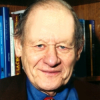Paul Kurtz

Paul Kurtz
Paul Kurtzwas a prominent American skeptic and secular humanist. He has been called "the father of secular humanism". He was Professor Emeritus of Philosophy at the State University of New York at Buffalo, having previously also taught at Vassar, Trinity, and Union colleges, and the New School for Social Research...
chipping cut eliminate everybody four games hard hopefully par practiced rounds short strokes three trying work year
They've been working hard on their games this year. I had them doing a lot of short-game practice. We practiced on the par 3 course, a lot of chipping and putting, really concentrating on the short game, trying to eliminate some strokes. Everybody has cut three or four strokes off their rounds this year. We'll keep doing the same things we've been doing all year and hopefully it'll work out for us.
consumers corporate database exposing home major personal potential
It was frightening enough for American consumers when major corporate database breaches here at home started exposing the potential vulnerability of their personal information.
life-and-love tree fruit
The meaning of life is not to be discovered only after death in some hidden, mysterious realm; on the contrary, it can be found by eating the succulent fruit of the Tree of Life and by living in the here and now as fully and creatively as we can.
religious commitment rights
The overriding need is "to develop a new Planetary Humanism" that will seek to preserve human rights and enhance human freedom and dignity and will emphasize our commitment "to humanity as a whole." The underlying ethical principle "is the need to respect the dignity and worth of all persons in the world community." Thinkers as diverse as Peter Singer and Hans Küng also emphasize the need for a new global ethic beyond nationalistic, racial, religious, and ethnic chauvinism.
religious philosophy atheism
Secular humanism is avowedly non-religious. It is a eupraxsophy (good practical wisdom), which draws its basic principles and ethical values from science, ethics, and philosophy.
religious party communication
Free inquiry entails recognition of civil liberties as integral to its pursuit, that is, a free press, freedom of communication, the right to organize opposition parties and to join voluntary associations, and freedom to cultivate and publish the fruits of scientific, philosophical, artistic, literary, moral and religious freedom.
moral-development creative excellence
Many humanists have argued that happiness involves a combination of hedonism and creative moral development; that an exuberant life fuses excellence and enjoyment, meaning and enrichment, emotion and cognition.
religious philosophy roots
In contemporary society secular humanism has been singled out by critics and proponents alike as a position sharply distinguishable from any religious formulation. Religious fundamentalists in the United States have waged a campaign against secular humanism, claiming that it is a rival "religion" and seeking to root it out from American public life. Secular humanism is avowedly non-religious. It is a eupraxsophy (good practical wisdom), which draws its basic principles and ethical values from science, ethics, and philosophy.
philosophical views afterlife
Secular humanism does not have the essential attributes of a religion: belief in a deity, the wish for some sort of afterlife, sacred dogma or texts, or an absolutist moral creed. Instead, it expresses a philosophical and ethical point of view, and it draws upon the scientific method in formulationg its naturalistic view of the nature.
would-be virtue claims
No one is infallible, and no one can claim a monopoly on truth or virtue. It would be contradictory for skepticism to seek to translate itself into a new faith.
religious principles silent
We cannot remain silent when someone of the Pope's stature and credibility confuses religious principles for science
other-worlds vision atheism
We need to be skeptical of utopianists who offer unreliable totalistic visions of other worlds and strive to take us there. We need some ideals, but we also need to protect ourselves from the miscalculations and misadventures of visionaries.
promise atheism belief
The skeptic has no illusions about life, nor a vain belief in the promise of immortality. Since this life here and now is all we can know, our most reasonable option is to live it fully.